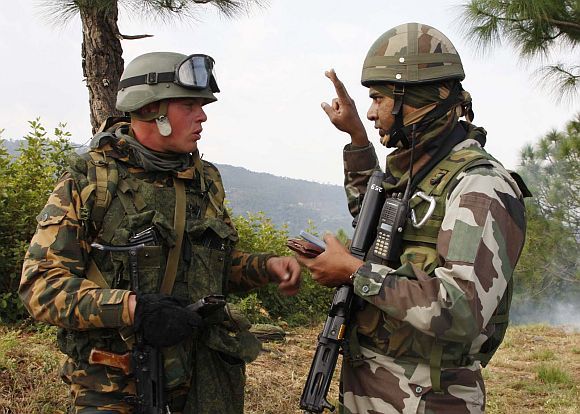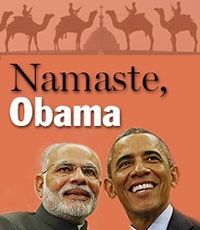 | « Back to article | Print this article |
 India must present its demands to America confidently, instead of fearing that its pocket will somehow be picked, says Ajai Shukla.
India must present its demands to America confidently, instead of fearing that its pocket will somehow be picked, says Ajai Shukla.
Prime Minister Narendra Modi's bold custodianship of the US-India relationship will bring President Barack Obama to India next week for his second visit, which promises to be as rich in symbolism as Modi's star turn at the Madison Square Garden last September.
With Washington and New Delhi already engaged in multiple fields, there is expectation that the US-India defence relationship will drive the defining strategic convergence of the early 21st century.
Yet, for this to happen both must focus less on cheesy platitudes -- liberal democracies, freedom-loving people, etc -- and give sober thought to how they can reconcile entirely different styles of thinking, planning and executing national defence.
Washington's geopolitical vision -- as articulated in its 'Rebalance to Asia' policy -- perceives an emerging bipolar power contest between the US and China, with India being the crucial swing player.
The US-India security relationship aims at building up India as a power that punches above its weight. The assumption underlying American support is that New Delhi will inevitably come down on the US side because of its geopolitical circumstances and its civilisational nature.
American realist thinker Ashley Tellis argues: "The real gains in the US-Indian partnership will be manifest only over the long haul and will be realised less by what India does for the United States than by what it becomes and does for itself."
Meanwhile, New Delhi inhabits a parallel reality, where it invokes a multilateral, consensual, UN-oriented approach to dealing with the region and the world.
New Delhi's reluctance to antagonise Beijing provides little traction to the narrative of a countervailing partnership. Howsoever strategic the vision of US leaders, its military and the Department of Defence (the Pentagon) remain important players in decisions on sharing weapons and technologies.
For them, the crucial question remains: "Are the Indians going to fight alongside us?"
While a formal alliance is neither conceivable nor desirable, with its commitment to fight together, New Delhi has not seriously tried to understand the inter-agency framework that controls US high technology and the release of weapon systems even to friendly countries.
If India wants co-development and co-manufacture, it must understand -- given America's strategic view of defence technology -- how this is inseparably linked with arms control issues, licensing, technology control and cyber-security. Without that understanding India will remain a mere buyer of American weaponry, with $9 billion worth of US arms bought in the last decade and another $7 billion worth in the procurement pipeline.
Without that understanding India will remain a mere buyer of American weaponry, with $9 billion worth of US arms bought in the last decade and another $7 billion worth in the procurement pipeline.
Despite all the lip service that New Delhi has paid to the notion of co-manufacture and co-development, not even a single joint development project has kicked off so far.
To smoothen cooperation, the Pentagon and our defence ministry agreed in 2012 to establish the Defence Technology and Trade Initiative, a high-level, inter-agency body that would ensure that bureaucratic red tape did not trip up the broader strategic relationship, and that India-related proposals did not lose traction or momentum as they filtered through tendentious bureaucracies.
It was co-chaired by US Deputy Secretary of Defence Ashton Carter, an out-and-out Indophile, and by National Security Advisor Shivshankar Menon. Since the defence minister of that time A K Antony wanted to have as little as possible to do with America, India's NSA -- with scant experience of defence production and technology -- had to co-chair the DTTI.
The resulting confusion in New Delhi has occasioned grim humour in Washington. After the Defence R&D Organisation strongly advocated a joint US-India project to develop an anti-ballistic missile system -- a defence against incoming ballistic missiles -- Carter broached the proposal directly with Menon. To Carter's surprise, Menon turned it down flat, apparently unaware of the DRDO's interest.
A similar lack of coordination was evident during Modi's visit to Washington last year, when an American official raised the possibility of US technology assistance in building India's next aircraft carrier -- something that the Indian Navy wants.
For India, technology assistance from the world's undisputed aircraft carrier experts can only be welcome. Yet, NSA Ajit Doval -- whose grasp of military technology is minimal -- blandly turned down US assistance.
Even today, the Pentagon worries that the Indian co-chairperson -- secretary for defence production, G Mohan Kumar -- is not influential enough for the job. He is technically the same grade as his US counterpart, Under Secretary of Defence for Acquisition, Technology and Licensing, Frank Kendall.
Yet the sorry truth is that Indian bureaucrats -- with little specialist knowledge -- are far behind their US counterparts in technical knowledge and in their level of empowerment.
Consequently, there is scepticism on the US side about the joint development proposals that India recently raised in the DTTI.
In 2013, Carter had proposed 5 co-development projects, which involved US and Indian entities working together to produce the next generation of US arms like the Javelin anti-tank missile.
During then US defence secretary Chuck Hagel's visit to India last year, the US raised another dozen co-development proposals. Now, without responding to those proposals, India has proposed 6 projects of its own.
Given the mixed messages that have emanated from New Delhi in the past, there is understandable scepticism amongst American interlocutors about whether the 6 new proposals have been adequately thought out, or whether they even have broad acceptability across the Indian government.
Asks one US interlocutor, "Have the highest levels in New Delhi identified the 6 proposals as clear strategic requirements and national defence priorities? Or have they been merely put forward as bargaining tools, with some official saying, 'Present them and let's see what the Americans say'."
It is time for South Block to stop behaving like a yokel at a country fair, unable to participate for fear of being pickpocketed.
Indian officials must move forward confidently, understanding US export control and procurement frameworks and using bodies like the DTTI to obtain what India needs.
With Ashton Carter heading the Pentagon and with a confident government in New Delhi, there has never been a better time.
Identify India's requirements clearly and put them on the table. Then the ball will be in the US court.
REDIFF RECOMMENDS:
Image: Indian and American soldiers at a India-US military exercise.